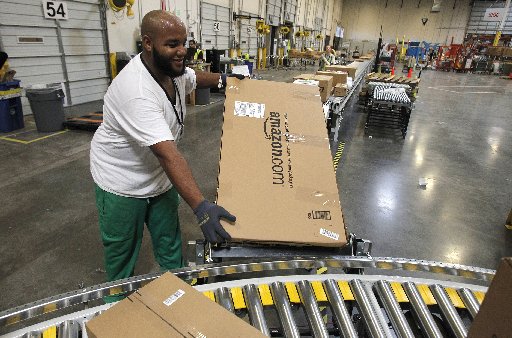Critics cry foul on Amazon tax advantage
Saturday, February 26, 2011
Tennessee's tax giveaways to Amazon could be nearly as much as the company will pay the 1,476 workers it plans to hire this year in Hamilton and Bradley counties, according to a new study by a group opposed to tax exemptions for Internet retailers.
Tennesseans for Fair Taxation, a Knoxville-based advocacy group, estimates state and local governments could lose more than $30 million a year in sales tax revenues and millions more in property and franchise taxes because of tax exemptions granted to Amazon.
The world's biggest Internet retailer is building $139.1 million of distribution facilities in Southeast Tennessee and plans to create more than 3,000 full-time and temporary, seasonal jobs by Christmas.
But some critics claim that investment doesn't justify Amazon's tax breaks and hurts conventional retailers that must collect and pay such taxes.
"The economic output from Amazon just won't measure up to what is being given away," said Elizabeth Wright, executive director for Tennesseans for Fair Taxation. "Amazon can afford to collect these taxes, but Tennessee can't afford not to have them do so."
Amazon officials did not respond Friday to the study. The company has urged Tennessee and other states not to require Internet retailers to collect sales taxes.
But Chattanooga Mayor Ron Littlefield said Amazon will boost the local economy "and all of those Amazon employees will pay taxes on the cars, homes and goods they buy."
BY THE NUMBERSAmazon sales and investment18.7 billion: Amazon North American sales in 2010, up 39 percent from 2009$270 million: Estimated Amazon sales in Tennessee in 2010$91 million: Value of Amazon distribution center being built in Chattanooga$48.1 million: Value of Amazon distribution center being built in Bradley County1,476: Number of full-time jobs at new Amazon centers in Southeast Tennessee$47.2 million: Projected full-time payroll for new Amazon facilitiesTax breaks and incentives$35 million: Projected annual Amazon sales tax losses in Tennessee in 2012$6.6 million: One-time job tax credit applied against half of franchise and excise taxes$4 million: Value of 80 acres given to Amazon by city and county this year.$720,000: City of Chattanooga property tax break in 2012$435,000: Hamilton County property tax break in 2012.$70,000: Bradley County property tax break in 2012Sources: Study by Tennesseans for Fair Taxation, Amazon sales, Hamilton County Trustee's Office, Tennessee Department of Economic and Community Development
If Amazon didn't come to Chattanooga, it still wouldn't collect taxes on Tennessee sales and there would be fewer jobs and less investment in the region to generate other taxes, Littlefield said.
"This is a good deal for Chattanooga," he said.
Calculating the tax losses from any Amazon decision is difficult to gauge, however.
Tennesseans for Fair Taxation initially released a report this week indicating that Amazon was avoiding $64 million a year in sales taxes in Tennessee. But when asked about the methodology of the study by the Times Free Press, the group recalculated the figure Friday and Middle Tennessee organizer lowered the sales tax loss estimate to only $30 million to $35 million on Friday.
Collecting sales taxes
Without a physical retail presence in Tennessee, Amazon isn't required to collect sales taxes on all its sales as most merchants must do.
Tennesseans who buy from Amazon are supposed to pay state and local sales taxes themselves. But few do, according to studies of Internet retailing by the University of Tennessee.
The 1 million-square-foot distribution centers Amazon is building near Volkswagen in Chattanooga and in northern Bradley County could mean it has a physical retail presence and must collect taxes.
Last year state and local recruiters offered property tax breaks, job training and infrastructure assistance and 80 acres of free land in Chattanooga to lure Amazon here.
Littlefield said recruiters talked with Amazon about exempting it from collecting sales taxes, but he said no written guarantee was offered.
The Tennessee Department of Revenue is proposing a rule to exempt "any dealer operating as a distribution center" from having to collect Tennessee sales taxes if at least half of its sales come from shipments out of state.
A hearing originally set for Friday on the rule was delayed because Gov. Bill Haslam has put a 45-day moratorium on state rule changes.
State rules differ
Haslam has suggested Congress adopt rules to govern taxation of Internet sales. But until then, he doesn't think Amazon should have to collect sales taxes because it is building distribution centers in the state.
Amazon has said it will close a Texas distribution center in April over a bill for $269 million sent by the state comptroller bill.
"Despite much hard work and the support of other Texas officials, we've been unable to come to a resolution with the Texas comptroller's office," Amazon said in a statement.
In 2009, Amazon cut ties with affiliates in Rhode Island, North Carolina and Hawaii over the issue. The company now collects sales taxes on all of its goods only in Kansas, Kentucky, New York, North Dakota and Washington, according to its website.
Tennesseans for Fair Taxation and some conventional retailers contend local stores are being hurt by Amazon's tax advantage.
"This hurts small business in our area by immediately putting us at a cost disadvantage," said Kim Smith, owner of a 2-year-old outdoor clothing company known as JK3 SoftWear in Chattanooga.
"As a mother of two boys in public schools, I'm also concerned about Amazon not paying their fair share of taxes to support our schools in Tennessee."
Smith cited two independent Chattanooga bookstores that closed in the past year, in part because of competition from online retailers.
"It doesn't make sense for a governor who says he wants to support business to hurt our local business people in this way," Wright said.

